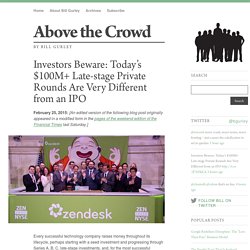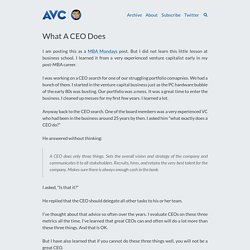

UK Readies 25% ‘Google Tax’ On Tech Giants’ Diverted Profits. In the lead up to the UK’s national election in May, big tech companies are finding themselves in the crossfire.

An article in the Sunday Times (paywalled) lays out more details around UK Chancellor George Osborne’s proposal for a “Google Tax” — a 25% tax on big tech companies’ profits from UK operations that, through creative accounting, have been diverted offshore, saving these businesses millions in tax bills. The tax will be included in the UK Budget, due to be published later this month. It’s unclear how many millions of pounds would be at stake here, or if there will be any attempt to collect taxes retroactively. When Osborne first alluded in December 2014 to his plans for a “Google Tax”, it was estimated that the UK could claw back as much as £1 billion ($1.5 billion) over five years. Investors Beware: Today’s $100M+ Late-stage Private Rounds Are Very Different from an IPO. February 25, 2015: February 25, 2015: [An edited version of the following blog post originally appeared in a modified form in the pages of the weekend edition of the Financial Times last Saturday.]

Every successful technology company raises money throughout its lifecycle, perhaps starting with a seed investment and progressing through Series A, B, C, late-stage investments, and, for the most successful companies, an IPO. Historically, different financial institutions specialized in different stages, because the assessment of risk and opportunity was considered unique at each stage — for example, a seed investor was unlikely to do late-stage financing, and vice versa. Over the last few years, the late-stage (pre-IPO) market has become the most competitive, the most crowded, and the frothiest of these financing stages. Investors from all walks of life have decided that “late stage private” is where they want to play.
Consider the case of Fab.com. This 1981 Computer Magazine Cover Explains Why We’re So Bad at Tech Predictions. If you were passionate about personal computers between the mid-1970s and mid-1980s, the odds were high that you were a reader of Byte magazine.

And if you read Byte, you were surely a fan of Robert Tinney, the artist whose cover paintings were one of the magazine's signature features for years. Tinney's work was imaginative, technically superb (he is a master of the airbrush) and, sometimes, very funny. Byte lost a little bit of its soul when the publication started phasing out his work in favor of standard-issue photos of standard-issue computers. While rummaging around the web last week looking for something else, I came across his cover for Byte's April 1981 issue at the Internet Archive.
I immediately shared it on Twitter, where it got about as enthusiastic a response as anything I've ever tweeted. What Microsoft Is this the Altair Basic of? February 2015 One of the most valuable exercises you can try if you want to understand startups is to look at the most successful companies and explain why they were not as lame as they seemed when they first launched.

Because they practically all seemed lame at first. Not just small, lame. Not just the first step up a big mountain. More like the first step into a swamp. A Basic interpreter for the Altair? Often the founders themselves didn't know why their ideas were promising. Most people's first impulse when they hear about a lame-sounding new startup idea is to make fun of it. When I encounter a startup with a lame-sounding idea, I ask "What Microsoft is this the Altair Basic of?
" Intriguingly, there are sometimes multiple answers. A Watch Guy's Thoughts On The Apple Watch After Seeing It In The Metal (Tons Of Live Photos) Imagine a man who grew up in the middle class, went do a decent school, got an okay job, lives in a nice apartment in some metropolitan town, maybe drives a German car and occasionally splurges on something nice for himself.

Do you see him wearing the Apple Watch? I don't. I do see him buying the Apple Watch, but it will need to go further than that. Take me, for example, I am sitting here on a gorgeous 27-inch iMac, wearing an ultra-thin perpetual calendar in white gold, and in fact, to my left is an Ikepod Hourglass (designed by Marc Newson) that I wanted from the minute I laid eyes on it.
I saved up and bought it because it's a perfect object, and even those people who don't care about time, or design, agree that it's beautiful. Unproven Autonomy. What A CEO Does. I am posting this as a MBA Mondays post.

But I did not learn this little lesson at business school. I learned it from a very experienced venture capitalist early in my post-MBA career. I was working on a CEO search for one of our struggling portfolio comapnies. We had a bunch of them. I started in the venture capital business just as the PC hardware bubble of the early 80s was busting. Anyway back to the CEO search. He answered without thinking: A CEO does only three things. I asked, "Is that it?
" He replied that the CEO should delegate all other tasks to his or her team. I've thought about that advice so often over the years.